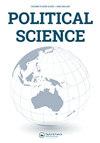首先是外交部在新西兰国际事务中的首要地位
IF 1.2
4区 社会学
Q3 POLITICAL SCIENCE
引用次数: 1
摘要
摘要新西兰自20世纪70年代以来一直致力于外交政策独立,尤其是寻求新的合作伙伴和市场,这对惠灵顿的官僚制度产生了影响。因此,与一些传统伙伴相比,新西兰外交部在外交政策的实施中发挥了相当重要的作用。新西兰外交和贸易部称自己为外交政策互动的“主要代理人”。随着时间的推移,包括新西兰外交部长在内阁中的高级职位,直到内阁指示新西兰驻海外大使负责新西兰的共同努力,这些安排确实赋予了外交部类似于“平等第一”的地位。外交政策(以及一些具有国际层面的国内政策)现在涉及范围越来越广的政府机构。涉及大国竞争的更为复杂的国际局势也迫使新西兰政府考虑其战略规划安排,外交部内部出现的进程证明了这一点,但现在国防部、总理和内阁部也在努力补充这一点。本文章由计算机程序翻译,如有差异,请以英文原文为准。
First amongst equals: the foreign ministry’s primacy in New Zealand’s international engagement
ABSTRACT New Zealand’s drive for foreign policy independence, and particularly its search for new partners and markets from the 1970s, has had an impact on Wellington’s bureaucratic arrangements. As a consequence, New Zealand’s Foreign Ministry has assumed quite a central role in the conduct of foreign policy when compared to some of its traditional partners. New Zealand’s Ministry of Foreign Affairs and Trade (MFAT) has referred to itself as the ‘principal agent’ of foreign policy interaction. The arrangements put in place over time, which include the high ranking in cabinet of New Zealand foreign ministers through to the cabinet direction that New Zealand ambassadors offshore are in charge of the New Zealand combined effort, does give the Foreign Ministry something akin to a ‘first amongst equals’ status. Foreign policy (and some domestic policy with international dimensions) is now involving a widening range of government agencies. A more complex international situation involving great power competition is also forcing the New Zealand government to consider its arrangements for strategic planning, as evidenced by processes that have emerged within MFAT, but are now also complemented by efforts within Defence and the Department of Prime Minister and Cabinet.
求助全文
通过发布文献求助,成功后即可免费获取论文全文。
去求助
来源期刊

Political Science
POLITICAL SCIENCE-
CiteScore
0.90
自引率
0.00%
发文量
13
期刊介绍:
Political Science publishes high quality original scholarly works in the broad field of political science. Submission of articles with a regional focus on New Zealand and the Asia-Pacific is particularly encouraged, but content is not limited to this focus. Contributions are invited from across the political science discipline, including from the fields of international relations, comparative politics, political theory and public administration. Proposals for collections of articles on a common theme or debate to be published as special issues are welcome, as well as individual submissions.
 求助内容:
求助内容: 应助结果提醒方式:
应助结果提醒方式:


